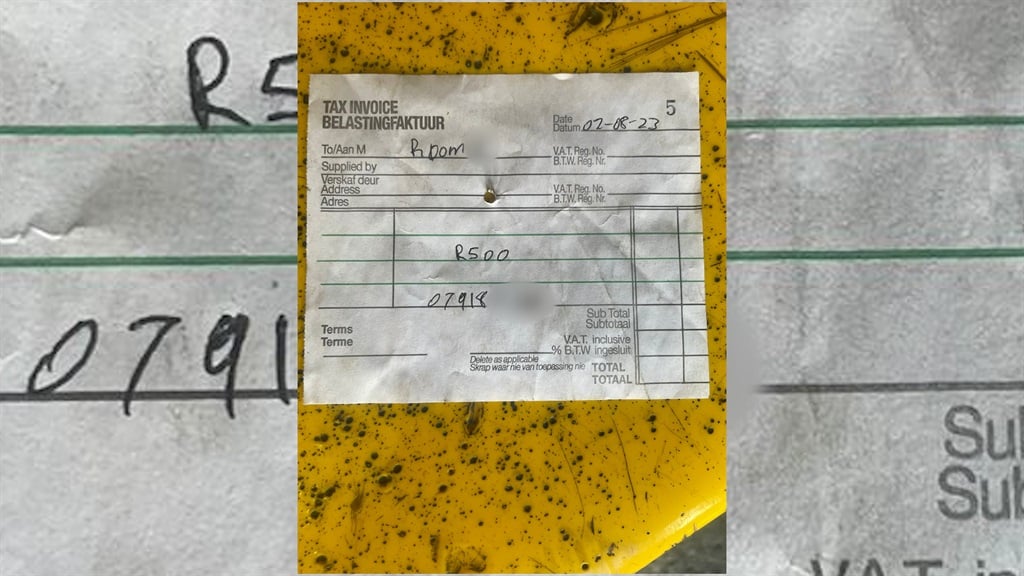Mamelodi, a vibrant township in South Africa’s capital city of Pretoria, is grappling with a sinister shadow cast by the infamous Boko Haram gang.
This notorious group, known for its ruthless tactics, has established a sophisticated extortion racket, leaving residents and businesses alike living in fear.
The once bustling streets now echo with whispers of fear, as residents navigate a daily reality where paying protection fees has become a grim necessity.
The audacity of Boko Haram knows no bounds, as they have even begun issuing receipts to their victims, attempting to legitimize their criminal enterprise.

“I have been operating in this area for over 15 years and have never come across anything like this. They even give me receipts after I pay them. They said this is because they are a legitimate body and have the best interests of the community at heart,” confided a businessman.
The businessman, who requested anonymity for fear of reprisal, revealed that he was forced to pay R500 every month to ensure the safety of his business. His employees, terrified by the threats of violence, have abandoned their jobs, leaving him struggling to keep his doors open.
“Before last year, I had five people in my employ who played critical roles in the functioning of this business,” he lamented.
“But they quit because they are scared. I don’t even have as many clients anymore, but these gangs assume I make a lot of money because my workshop [is busy].”
The businessman’s story is not isolated. Boko Haram’s extortion racket extends its tentacles to virtually every foreign-owned spaza shop in Mamelodi, demanding a monthly “protection fee” of R700.
“This has become a norm for us. We don’t even go to the police station to report the matter because that will cause a bigger headache or the loss of life. Everyone in the community knows that you either pay up, lose your business or lose your life,” the businessman said.
The gang’s reach extends beyond spaza shops, targeting a wide range of businesses, including motor vehicle workshops, hair salons, taxi operators, and even landlords. An informal tyre trader revealed he pays R100 a week, while hair salons are forced to fork out R200 weekly.
The construction of a magistrate’s court in the area, a project that has been delayed for a decade, has also fallen victim to Boko Haram’s extortion demands.
The audacity of the gang extends to even targeting community patrollers, who are supposed to be safeguarding the very communities they are extorting.
“These guys told us that while we protect the community, they are protecting us because everyone knows who they are, and nothing will happen to us while they are around,” said one patroller.
“We paid them R1 000 for one month. We haven’t paid them again because we don’t have that money.”
The patrollers, who rely on donations from residents to carry out their duties, are now caught in a Catch-22 situation. They are forced to pay protection fees to the very criminals they are supposed to be combating, leaving them vulnerable and powerless.
“We are on the streets from 04:00 to 07:00 to make sure that people get to work safely, and we patrol our neighbourhoods when it gets dark to prevent cable theft incidents and criminal activities. We don’t even make R500 a month because not every household can afford to donate,” the patroller explained.
The fear instilled by Boko Haram is palpable, extending even to those who organise events in the township. An events coordinator revealed how members of the gang demanded free access and expensive alcohol and food at an event he helped organise.
“These guys don’t care. They came straight to me and told me that they want VIP treatment, and, in return, our event will go on without any interruptions. We didn’t know what to do or what to say because we know how infamous the group is, so we allowed them to do what they wanted to avoid spoiling the event,” he said.
Even landlords are not spared. One landlord recounted how she is forced to pay Boko Haram R200 for every R600 she receives from tenants.
“These boys told me that they are protecting the township,” she said while her voice was dripping with sarcasm.
“They said my tenants could be criminals who intend on doing harm to the community and that the fee I pay [to the gang] would ensure that nothing happens to anyone. This is ridiculous, but we are scared of them and pay.”
The police, while acknowledging the seriousness of the situation, are struggling to contain the spread of Boko Haram’s extortion racket.
“In relation to sporadic incidents of violence and extortion at construction sites and businesses across the country, 722 extortionists have been arrested in the last five years,” said police spokesperson Brigadier Athlenda Mathe.
“Fifty-two of them were found guilty and collectively sentenced to 89 years and seven months’ imprisonment. Ninety-three cases are still under investigation where groupings and individuals of interest have been identified.”
Mathe added that some of the problematic provinces identified where the extortionists operated included the Western Cape, Eastern Cape, Northern Cape, Free State, Limpopo, North West, and Mpumalanga.
Despite these efforts, Boko Haram’s grip on Mamelodi remains strong, leaving residents and businesses trapped in a cycle of fear and extortion. The question remains: will the authorities be able to break the gang’s stranglehold on the community before more lives are lost and businesses are destroyed?

Follow @MyZimbabweNews












